This past March at the Hong Kong Arts Festival, much of the audience walking into the third installment of Loong Man-hong’s Floating Family trilogy had some idea of what to expect. Veterans of Hong Kong Astronaut, set in 1997, and All Out of Love, set in 2004, had already seen the Wong family through the former British colony’s return to Chinese rule and the SARS epidemic that later shook the territory to its core.
But Loong’s Vacant in the City offered a new element entirely. Set in the very near future, on the eve of the 2017 election for Chief Executive in late March, the play finds the Wong family as divided socially and politically as Hong Kong itself. No longer did family chatter—or the ringtone of a now-archaic Nokia—bring a tinge of nostalgia to the audience. Instead, elements crept in from the daily headlines. A palpable cringe rippled through the room when a character mentioned a firebombing on the MTR, Hong Kong’s hyper-efficient subway system, that had taken place only weeks before.
To American theatregoers, this may sound like a Chinese knock-off of Richard Nelson, whose topical trilogy The Gabriels: Election Year in the Life of One Family had appeared at the Hong Kong Arts Festival two weeks earlier, though festival producer So Kwok-wan puts it a bit more charitably. “When I first saw Richard Nelson’s plays, I was deeply touched that this kind of writing still exists,” he says wistfully. “Nelson offers no ‘grand ideas.’ Characters are conveyed in single brushstrokes, with a fragile line between character and actor. I’ve always wanted this kind of play in Hong Kong, where characters subtly reveal what’s happening in the world around them. And I thought, with Hong Kong in such a delicate moment, facing an important anniversary, why not do it now?”
The producer saw Nelson’s similarly styled Apple Family Plays in 2013 and immediately tried to book the cycle. Told that the Apples were no longer touring, So commissioned his own trilogy from Loong, an award-winning playwright and screenwriter. Only later did So learn about The Gabriels, which premiered in 2016 at the Public Theater in New York City.
Bringing The Gabriels to Hong Kong, fresh from another festival appearance in Perth, Australia, was a programming coup, not just in putting one trilogy in relief against another but in revealing larger links between two distinct theatre traditions. Observers in both camps frequently note a disparity in the connection between Asia and the West; now it was in the spotlight.
Ask about theatre in Hong Kong and some will tell you that the scene is active and vital. Others will say that productions are supremely local and lack interest for anyone outside the territory. Both would largely be correct.
Given Hong Kong’s singular history—and its ever-shifting search for identity—it’s hard to imagine the situation looking any different. Hong Kong theatre is essentially the offspring of a shotgun marriage between the Chinese stage, where spoken drama dates back only to the early 20th century, and British dilettantism, encapsulated in G.K. Chesterton’s quip that “anything worth doing is worth doing badly.” Chinese audiences eagerly embraced the art form; British audiences maintained their middle-class theatregoing tradition. Initially neither side was especially concerned about the quality of their efforts.
That began to change in 1977 with the founding of the Hong Kong Repertory Theatre (HKRep), the territory’s first professional Cantonese-language company. Two years later, the British Council founded the Chung Ying Theatre Company, Hong Kong’s first English-language troupe. “Hong Kong has always been exposed to much of the world,” says Anthony Chan, the HKRep’s artistic director since 2008. “And often we’ve been the window for our colleagues in China.”
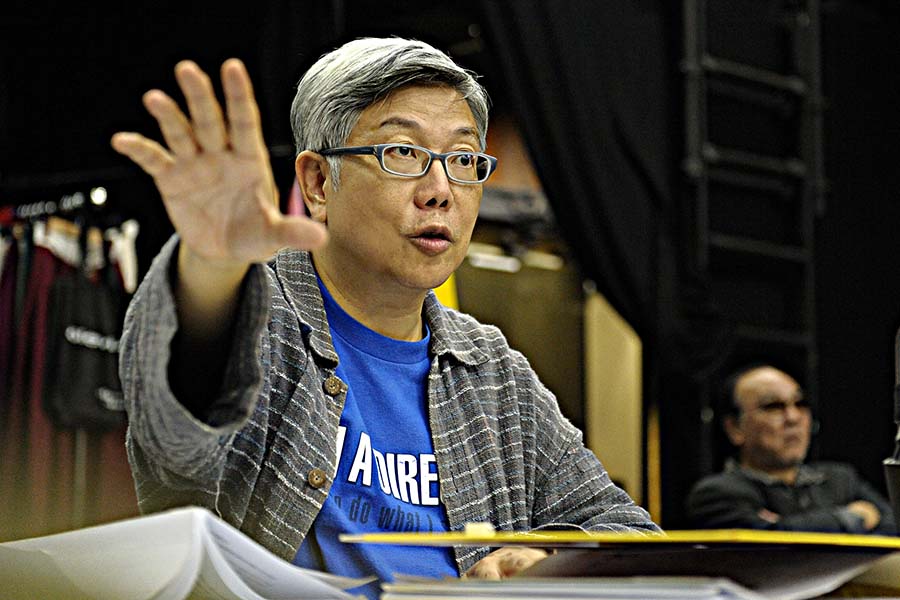
Chung Ying faced the opposite direction. “We were there to revitalize local English-language drama,” says Dominic Cheung, who began his career with the company as an actor and returned in 2011 as general manager. “The company often brought over professionals from England. We saw ourselves as a bridge to the outside world.”
Both sides, though, found they needed to cultivate their audiences. “In the 1970s and ’80s, it was always cinema people who were more trendy, more cultured,” says the Arts Festival’s So, a former journalist. “In the U.S. and U.K. it’s usually the other way around, but here it was the theatre people who were simply looking for light entertainment.”
The problem wasn’t colonialism, he adds. “If anything, the British presence maintained higher production standards,” So says. “The problem was that for any theatre tradition to flourish, it must grow organically from within the culture.”
A major turning point came with the 1984 Sino-British Joint Declaration, which earmarked Hong Kong as a Special Administrative Region of China beginning in 1997. Another was the opening of the Hong Kong Academy for Performing Arts (HKAPA), established in the mid-1980s and dispensing academic degrees by the early ’90s. The first resulted in a sharp increase in original Chinese-language plays; the second in a notable improvement in homegrown artistry and technical competence.
As far as organic development was concerned, however, no company made more of an impact than Zuni Icosahedron, the alternative multimedia troupe founded in 1982 by Danny Yung, a former architect, social worker, and full-time professional gadfly. Having been deeply immersed in Asian-American activism in New York and Berkeley in the ’70s, Yung returned to Hong Kong and was soon staging what he called “structured happenings.”
Almost immediately, Yung revealed an uncanny talent for touching raw nerves. In 1984, in response to the Joint Declaration, he created a play cycle entitled Opium War, a steampunk history of Hong Kong that notably featured Queen Victoria sitting in her living room listening to reports of the Yangtze battle on the radio.
But it was the final evening, entitled In the Theatre, that made the most lasting impact. In his experiment with “space-shifting,” Yung invited his audience to come onstage. The Hong Kong Arts Centre house manager angrily ordered patrons back to their seats, leaving Yung to negotiate. Some audience members moved immediately to the stage; others remained in their seats. Some sat semi-committally on the edge of the stage, while others inched toward the exit, expecting violence.
“The reaction itself made a statement,” Yung maintains. “In Hong Kong, some people were emigrating, others decided to stay. Some conformed immediately, others watched from a distance. The play became a perfect prototype of the city at that time.”
Quickly blacklisted by the Arts Centre, Zuni made headlines, though even the newspapers remained divided between reflexively supporting the official venue and respecting artistic expression. For the impish provocateur, it was an artistic success and a clear step toward the company’s maturity.
“These young artists now realized why they were doing theatre,” Yung says. “Theatre is there for artists to find out about themselves, their relationship to their environment, and the systems all around us. Then you figure out how to relate to those systems in the proper way.”
As with theatre in most places, Hong Kong’s companies struggle to fill seats—and, also as in most places, there is plenty of blame to go around. Some pin audience downturn on the 2003 SARS epidemic, when people were loath to appear in enclosed spaces with strangers. Others point to the swine flu outbreak in 2007, or the economic downturn in 2008. The 2014 Umbrella Movement, which saw hundreds of thousands of protesters demanding democratic elections, may have inspired many artists, but it did little to bring audiences into the theatre.
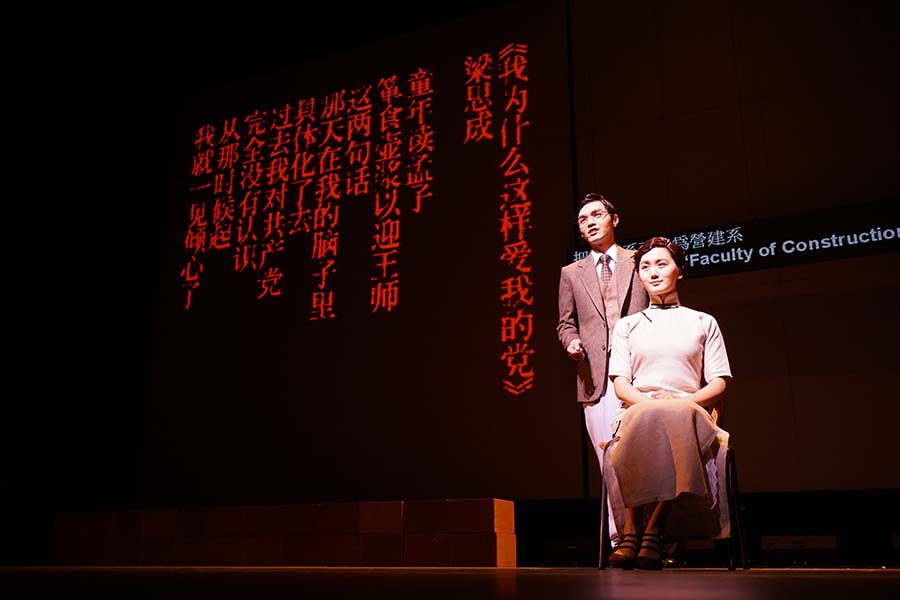
Nearly everyone, though, points to the HKAPA, whose success in training young artists has become a mixed blessing. With a population of just over 7 million, Hong Kong now has more than 300 dramatic productions a year, mostly from dozens of smaller companies formed by Academy graduates shut out of larger, established companies.
Such organizations range from the multidisciplinary, multicultural Theatre du Pif, cofounded by Bonni Chan and Sean Curran in the early 1990s, to Pants Theatre Production, an amateur partnership turned professional in 2012 with cofounder Wu Hoi Fai at the helm. Inspired by Moisés Kaufman and the Tectonic Theater Project’s The Laramie Project, which Pants produced in Wu’s translation, the company has championed a particularly local brand of documentary theatre with shows such as 1967, focusing on Hong Kong’s Leftist riots. Wu’s current project is On the Record, distilling interviews with local newspaper reporters and digital media figures on the subject of Hong Kong’s eroding press freedom.
“The box office from these shows is often a disaster,” Wu admits, “but public reaction and feedback from peers have been impressive. Theatre may not be able to solve society’s problems, but it can inspire people to search for proper information about important issues.”
This plethora of local productions resonates heavily among the city’s major players. “The HKRep used to be one of a kind,” says Chan. “Now we’re only the top among many companies, constantly struggling to maintain that lead.” Chan’s mission statement for the company—championing both Chinese translations and original plays—differs little on paper from that of his predecessor, but in practice the priorities have thoroughly reversed in favor of new work.
Bearing the brunt of that change is the HKRep’s assistant artistic director Fung Wai-hang, a former actress now heading the company’s Black Box, a rehearsal space converted into a permanent performance venue. Although Fung lists her objectives as cooperating with both local and international organizations and providing a forum for company members to test new projects, her chief goal has been cultivating a new generation of theatre practitioners.
“Our program starts with very young playwrights,” she says. “I’ll usually pair a new playwright with an experienced director, but if the play is strong enough I’ll give the opportunity to a young director. Then we have open casting, which is a welcome change from only using actors on our own roster.”
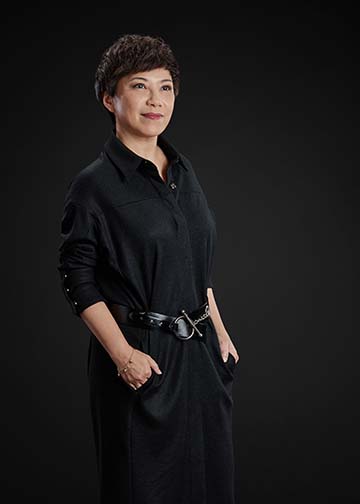
So successfully has Fung curated a parallel season alongside the Rep’s mainstage offerings that the company has launched a recurring International Black Box Festival. Last year’s offerings opened with Ivo van Hove’s production of Cocteau’s La voix humaine from Toneelgroep Amsterdam.
“Why do I bring these shows here? Because our actors are always so busy,” Fung exclaims cheekily. “Instead of scolding them to see more things, I bring things here so they have no excuse. The most important thing is expanding our vision.”
Similar sentiments echo throughout the city’s theatre community, particularly among those with the longest history of cultural exchange. “It’s crucial for Hong Kong people to remain in contact with the outside world,” says Chung Ying’s Cheung. “After a while you lose touch.”
Cheung speaks from experience. After a successful run at home, Chung Ying took Jonathan Holloway’s Blood for Blood, a reimagining of A Tale of Two Cities coproduced with London’s Red Shift Theatre, to last year’s Edinburgh Fringe Festival. “We were big news in Hong Kong,” he says, “but over there, with such keen competition, we were nothing.”
Cheung had a rude shock, though, earlier this season during preparations for Chung Ying’s translated production of Annie Baker’s 2014 Pulitzer Prize-winning play The Flick. After receiving initial promotional materials showing an African-American character portrayed by a Chinese actor in dark makeup, the playwright immediately withdrew performing rights. “There were no negative implications—no intention to make fun of or insult black people,” Cheung maintains. “The standard in Hong Kong is always to remain as close as possible to the play’s original setting and context. We rarely have black actors in Hong Kong, and never dream that any of them can speak Cantonese.”
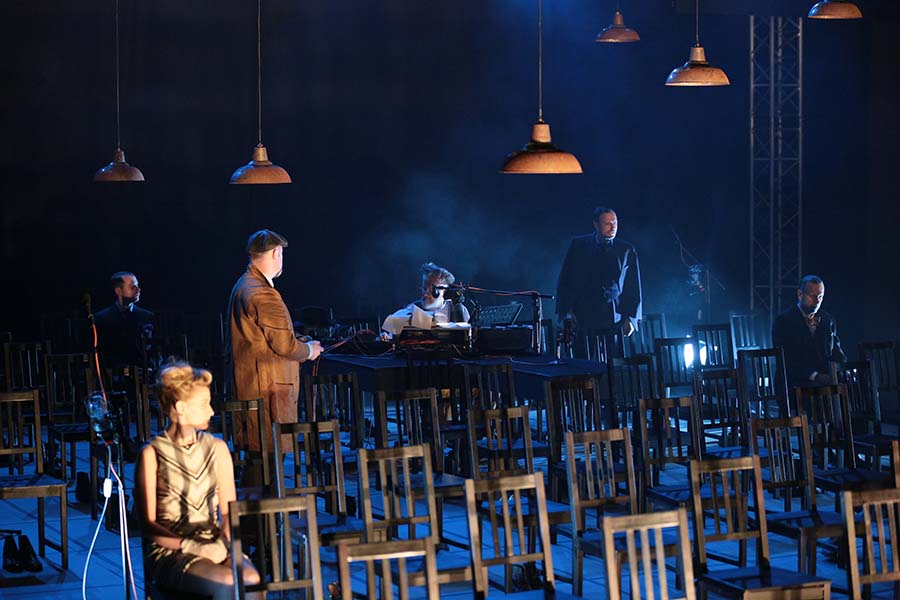
After Chung Ying dropped the blackface, rendering the play with Chinese actors essentially playing Caucasians, Baker’s camp eventually relented. “Speaking for myself, I have a hard time with this,” says Cheung, who is organizing a public “sharing session” on the topic. “If everyone has to follow this trend, what’s the point of stretching as an actor? Why should anyone learn Russian accents if only Russian actors can play Russian characters? But the experience only reinforces the need to engage with what’s going on in the outside world.”
How should we define theatre in Hong Kong, and what lies in store? The first part is comparably easy. “Hong Kong theatre starts with our dialect,” says the HKRep’s Chan, echoing a near-universal sentiment. “Theatre is a way of containing our history. It can record Chinese values better than any textbook. But really, we’re the only place in the world upholding Cantonese drama.”
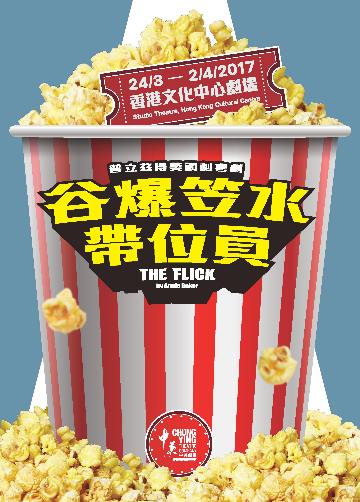
Indeed, not even in Cantonese-speaking Guangzhou, only 90 minutes past the mainland Chinese border, is much Cantonese spoken onstage. This says less about audiences there, who according to Chan and Cheung react more enthusiastically to Cantonese productions than audiences in Hong Kong, than it reflects professional realities. Regional troupes crave recognition, and only productions in Mandarin, China’s official dialect, are eligible for national awards.
“What’s lacking most in Hong Kong theatre is an industry structure,” says the Arts Festival’s So. “Let’s say you have something successful, with really original writing and a great cast. In England, it would start at a small house, maybe get picked up by the National Theatre, and if it does well there, maybe transfer to a commercial run on the West End. In Hong Kong, there are very few venues, and they’re all controlled by the government. So even if A Floating Family is a tremendous success, where’s it going to go?”
Many of So’s peers are eying the West Kowloon Cultural District, a multi-billion-dollar construction project that has already become arguably the most ambitious—and controversial—arts hub in the world. With more than dozen core arts venues, the district is currently scheduled for completion in 2022.
The HKRep is already trying to leverage its success with its Black Box to prove its competence as a resident organization. For its part, Chung Ying is aiming to borrow some of the Rep’s consolidation tactics: fewer productions in longer runs, preferably in conjunction with other performing arts organizations. Both Chan and Cheung cite the need to reach in the other direction: In addition to touring more aggressively, both would love to have more of their original Cantonese plays translated into English. “We’ve translated so much from them that it’s time they pay attention to Asia,” Chan maintains.
To Zuni’s Yung, though, this simply indicates a failure of imagination. “I don’t get obsessed with creating theatre pieces—I’m interested in creating institutions,” says Yung, who was instrumental in forming Hong Kong’s Arts Development Council and the Hong Kong Institute of Contemporary Culture, as well as advising the West Kowloon cultural project. “The problem is that so many Hong Kong arts organizations are only producers. They survive, but they never question why they exist.”
For many of Hong Kong’s smaller organizations, though, survival is already enough. “Theatre is a tool to raise people’s awareness,” says Pants’ Wu, citing a Singaporean colleague’s metaphor of call and response “It’s the artist’s occupation to call out. Now, we can’t determine the audience’s response, but if we as theatre artists can establish a space where the audience feels free to respond, we’ve already fulfilled our task.”
Ken Smith is the Asian performing arts critic for the Financial Times. He has written about arts and culture on five continents for a wide range of publications, including the Los Angeles Times, Time Out New York and Gramophone magazine.
*A previous version of the story erroneously reported that the West Kowloon Cultural District will be completed in 2020, it’s actually in 2022 that the final venue in the district will open.


